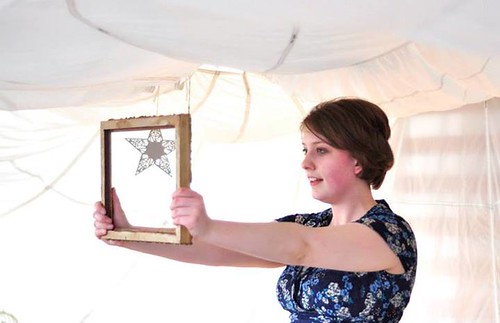Review – Hide and Seek
✭✭✭✭✩ Absorbing physical theatre
Central Hall (Venue 295): Mon 5-Sat 10 Aug 2013
Review by Hugh Simpson
Rush Productions’ Hide and Seek, a two-handed piece of physical theatre inspired by Carol Ann Duffy’s fairy story The Stolen Childhood,is a compelling production which shows this new company has great potential.
The space on the corner under the Central Hall at Tollcross was until recently a charity shop, so it’s fitting to walk into a bric-a-brac-filled evocation of a child’s room, artfully combining ancient and modern in Claire Fleck’s excellent design.
The tent-like structure overhead helps bring the audience closer to the acting space, and the extremely comfortable sofas help them forget the roaring from the traffic outside on one of Edinburgh’s busiest junctions just feet away.
At first the action is purely wordless as Catherine Major (Lucy) and Lewis Sherlock (Greg) draw the audience into a childhood world which is honestly portrayed and refreshingly lacking in tweeness. It soon becomes clear that we are expected to participate in their world, but this is audience interaction which not even the most reserved could find objectionable. The worst I risked was a broken nail prising open a series of miniature Russian dolls; suffice it to say that, even after all this time, the smallest doll still does not open.
The two performers are excellent foils for each other physically. Sherlock is goggle-eyed, arms windmilling outward, puppyishly eager to please; Major is droopy-eyed, body turned inward, able to suggest a dark past for her character with great economy. Jo Rush’s excellent direction means the wordless action, interspersed with their reactions to recorded voices as a more adult world is invoked, is all so involving it is almost a disappointment when they begin to speak. The children’s fantasy world would certainly have been at least as convincing with less narration.
An undertone of aching melancholy
Sherlock’s use of props is particularly strong. He is able to convey emotion simply by wearing half a jacket, while his use of a picture frame to demonstrate the history of his child’s character is a masterstroke. Without anything in his hands, he is not quite as accomplished – some of his clowning looks a little self-conscious so close up. The chemistry between the two participants seems more convincing when they play children than when they play adults, but this may well be a deliberate choice to show how the pressures of ‘grown-up’ reality come between even the closest people.
The audience is left to do a lot of work themselves regarding the significance of much they have seen. It seems to be suggesting that living with too much reality is as dangerous as living in a fantasy world, and that we are not good at having balanced lives. But a great deal is left open to question in this thought-provoking production, which is why the ending disappoints.
Throughout the play, there is an undertone of aching melancholy, of hopes unfulfilled and dreams repressed, all underscored by Jo Karselis’s haunting pastoral music. What goes before deserves to end as profoundly as meditations on the end of childhood such as Moominvalley in November or A Child’s Garden of Verses.
Instead the ending, though not detracting too much from an extremely accomplished piece of work, is conventional – almost trite. This might be down to a desire to give the piece some kind of ‘conclusion,’ but it’s like that Russian doll – things are not always open-and-shut.
Running time 1 hour
Run ends Sat 10 August.
Daily, 3pm and 6pm.
Venue 295 Central Hall, 2 West Tollcross, EH3 9BA
Tickets from www.edfringe.com
ENDS




















Comments (3)
Trackback URL | Comments RSS Feed
Sites That Link to this Post